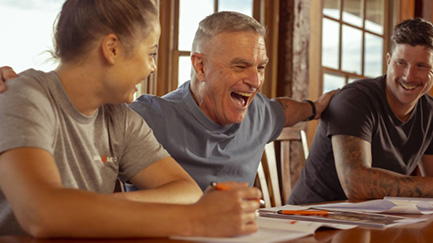We need to look after our mental health just like we do our physical health. The good news is that exercise can help to regulate our mental wellbeing.
We need to look after our mental health just like we do our physical health. The good news is that exercise can help to regulate our mental wellbeing.
Exercise and being active is beneficial for everyone’s mental health. But do we understand how? Well, exercise increases the release of numerous ‘feel-good’ chemicals in our body, including endorphins, serotonin and dopamine.
Research has shown that sustained aerobic exercise (walking, running, swimming laps, etc.) over the period of a few months can increase the number of cells which produce dopamine, an important neurotransmitter that is involved in conditions such as depression, ADHD, and some type of Parkinson’s disease.
Exercise can also help to reduce stress over time, improving our tolerance and reducing our sensitivity to stress signals sent by the brain. This is beneficial for conditions such as anxiety and PTSD.
Research has shown that exercise also benefits neuroplasticity (the brain’s ability to continue changing and adapting in response to life experiences) by releasing a protein called Brain Derived Neurotrophic Factor (BDNF). The release of BDNF may also improve PTSD symptoms as well as learning, memory and cognition.
How can exercise benefit veterans’ mental health?
Exercise can be a less stigmatising form of mental health management for veterans and can provide a sense of familiarity as regular exercise sessions is something all Defence personnel would have completed during their service.
Exercise can also provide value to other important aspects of life for veterans and families such as being fit to run around with your kids, being mobile and able to self-manage pain for work or travel, or even to get up and down off the floor while playing with grandchildren or pets.
Another way that exercise benefits mental wellbeing is through mindful movement. Balance exercises and breath-controlled slow resistance training can help to bring awareness to your body. These exercises are often performed in slow movements, and you can focus on which muscles are activating and working as you exercise or focusing on your breathing.
Taking a walk in nature and taking note of what your five senses are picking up and really focusing on these is also beneficial for mindfulness. In Japan they call this ‘Forest Bathing’ and it has been prescribed for physical and mental health benefits for over 25 years.
Getting active is also a great way to make new social connections, whether it is with local community clubs or with veteran organisations such as Mates4Mates. Social support networks are important for our mental health and provide a useful way for veterans to reintegrate and socialise post-discharge.
Seeking help from an exercise physiologist
Exercise physiologists understand every individual is different and on their own health journey, helping veterans increase movement and exercise in a way that is suitable and enjoyable for them personally.
An appointment with an exercise physiologist can help explain the different ways to self-manage and regulate your health conditions outside of the gym space, using different intensities and exercises to recommend what is best for you. This includes finding a way to incorporate more movement into your daily schedule, working alongside regular activities and daily tasks.
A handy starting place is adding ‘exercise snacks’ into your day. These include basic physical activity such as taking the stairs instead of the lift or getting off the bus one stop early or parking further away from your destination.
Support at Mates4Mates
Mates4Mates provides tailored programs for individuals to manage or improve their mental health through consultation with our
exercise physiologists.
Mates4Mates also offer
Four-Day Wellness Programs, discussing the neuroscience and physiology behind how exercise can help our mental health. Our weekly Matwork Pilates and hydrotherapy sessions also include elements of relaxation or mindfulness.
We also have regular social connection activities across Australia to help you meet other veterans in a range of physical activity settings, allowing you to explore and discover what you enjoy doing while building a network of new friends.
If you’re a veteran or family member and want to find out more about how Mates4Mates can support you, reach out to us on 1300 4 MATES (62 837) for a confidential chat.
Written by Andrew Crawshaw, Mates4Mates Exercise Physiologist


